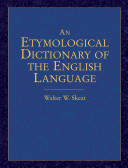The Importance of Comparative Alphabets
But when I had grasped the facts that spellings are often false, that words can be invented, and that explanations are often wrong, I found that worse remained behind. The science of phi- lology is comparatively modern, so that our earlier writers had no means of ascertaining principles that are now well established, and, instead of proceeding by rule, had to go blindly by guesswork, thus sowing crops of errors which have sprung up and multiplied till it requires very careful investigation to enable a modern writer to avoid all the pitfalls prepared for him by the false suggestions which he meets with at every turn. Many derivations that have been long current and are even generally accepted will not be found in this volume, for the plain reason that I have found them to be false ; I think I may at any rate believe myself to be profoundly versed in most of the old fables of this character, and I shall only say, briefly, that the reader need not assume me to be ignorant of them because I do not mention them. The most extraordinary fact about comparative philology is that, whilst its principles are well understood by numerous students in Germany and America, they are far from being well-known in England, so that it is easy to meet even with classical scholars who have no notion what 'Grimm's law' really means, and who are entirely at a loss to understand why the English care has no connection with the Latin cura, nor the English whole with the Greek oAos, nor the French charitf with the Greek x
Notes:
Folksonomies: spelling etymology philology
Taxonomies:
/science (0.577352)
/art and entertainment/visual art and design/design (0.577003)
/business and industrial/agriculture and forestry/crops and seed (0.572544)
Keywords:
Comparative Alphabets (0.986657 (negative:-0.503476)), false suggestions (0.949415 (negative:-0.657442)), careful investigation (0.926682 (positive:0.350565)), earlier writers (0.918327 (neutral:0.000000)), comparative philology (0.909550 (positive:0.618271)), old fables (0.901924 (positive:0.680953)), Latin cura (0.901830 (negative:-0.335116)), plain reason (0.899312 (negative:-0.490848)), extraordinary fact (0.878884 (positive:0.618271)), modern writer (0.873865 (negative:-0.657442)), French charitf (0.868839 (positive:0.266335)), classical scholars (0.866700 (positive:0.570647)), numerous students (0.857253 (positive:0.456829)), English care (0.846277 (negative:-0.335116)), Greek oAos (0.844069 (negative:-0.350679)), principles (0.639457 (positive:0.456829)), guesswork (0.624845 (negative:-0.539615)), derivations (0.613237 (negative:-0.416757)), spellings (0.613225 (negative:-0.503476)), ignorant (0.609161 (negative:-0.605616)), pitfalls (0.593576 (negative:-0.657442)), explanations (0.586085 (negative:-0.700836)), notion (0.585205 (negative:-0.460894)), means (0.580682 (neutral:0.000000)), Importance (0.579656 (negative:-0.503476)), science (0.579226 (neutral:0.000000)), facts (0.579184 (negative:-0.503476)), words (0.578955 (negative:-0.283043)), turn (0.578641 (negative:-0.232567)), rule (0.577095 (negative:-0.345519))
Entities:
England:Country (0.680429 (negative:-0.350679)), Grimm:Person (0.623073 (negative:-0.460894)), writer:JobTitle (0.562861 (negative:-0.657442)), Germany:Country (0.497870 (positive:0.456829)), America:Continent (0.489570 (positive:0.456829))
Concepts:
Latin (0.947944): dbpedia | freebase | opencyc | yago
Linguistics (0.899043): dbpedia | freebase | opencyc
Latin alphabet (0.865049): dbpedia | freebase | opencyc | yago
Greek alphabet (0.857342): dbpedia | freebase | opencyc | yago
Historical linguistics (0.843764): dbpedia | freebase | opencyc
Indo-European languages (0.776806): dbpedia | freebase | yago
Philology (0.688784): dbpedia | freebase
Etymology (0.663025): dbpedia | freebase | opencyc






